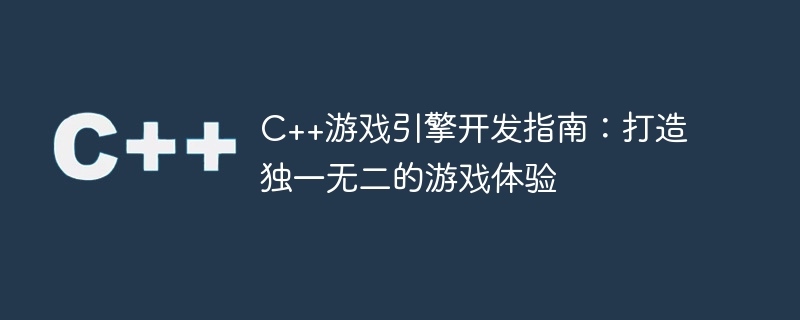Home >Backend Development >C++ >C++ Game Engine Development Guide: Creating a Unique Game Experience
C++ Game Engine Development Guide: Creating a Unique Game Experience
- WBOYOriginal
- 2023-11-27 10:48:40876browse

In today's era of booming game industry, every game developer hopes to create his or her own unique game experience. C game engine development has become one of the core ways to achieve this goal. In this article, we will explore how to use C game engine development to create a unique gaming experience.
1. Choose a game engine that suits you
Before we start developing our own game, we first need to know how to choose a game engine that suits us. So how to choose? We can consider the following aspects:
1. Function: The game engine needs to have the functions we need, such as virtual physics engine, rendering engine, etc.
2. Development difficulty: The development difficulty of the game engine also needs to be considered. If we are beginners, we can choose some easy-to-use engines, such as Cocos2D, Unreal Engine, etc.
3. Commercial Authorization: Commercial authorization is another factor to consider. If we are developing commercial games, we need to understand the licensing methods and related costs of the game engine.
4. Community support: Community support for game engines is very important. If a game engine has strong community support, then the problems we encounter while using this engine can be solved through the community.
2. Use game engines for game development
After choosing a suitable game engine, we can start using the game engine for game development. The following are some things we need to pay attention to:
1. Familiar with the API of the game engine: Familiarity with the API of the game engine is the basis for game development. We need to understand how the game engine calculates virtual physics and graphics rendering. These operations are completed through the API interface.
2. Use the editor of the game engine: Many game engines provide editors that allow us to design game scenes without writing code. For example, the Unity engine editor allows us to edit, add, delete and other operations directly in the scene.
3. Game engine performance: Performance is very important in game development, and this is also the advantage of the C game engine. We need to understand the performance indicators of the game engine, such as frame rate, memory usage, etc., and tune these indicators.
3. Develop a unique game
After the above two steps are completed, we can start to develop our own unique game. Here are some tips:
1. Design unique game mechanics: Unique game mechanics are the soul of the game. We need to design some unique game mechanics to make players feel that the game is very novel, thereby increasing the playability and attractiveness of the game.
2. Produce excellent game materials: Game materials include game scenes, characters, sound effects, etc. Produce some excellent game materials to immerse players in the game.
3. Reasonable game difficulty: Good game difficulty can make the game more attractive. We need to grasp the difficulty of the game well so that players can experience a sense of challenge and accomplishment in the game.
Summary:
C Game engine development is one of the core ways to develop a unique game experience. Choosing a game engine that suits you, becoming familiar with the game engine API, using the game engine's editor, and optimizing the performance of the game engine are all basic steps for game development. At the same time, we also need to use our own creativity and design capabilities to create a unique game experience with unique game mechanics and excellent game materials.
The above is the detailed content of C++ Game Engine Development Guide: Creating a Unique Game Experience. For more information, please follow other related articles on the PHP Chinese website!
Related articles
See more- 2021 Popular PHP Development Framework Ranking
- What is the difference between C language and C++
- What development environment and computer configuration are required for python?
- What is the difference between C and C++
- What data collection technology applications does the application development of smart health bracelets embody?

